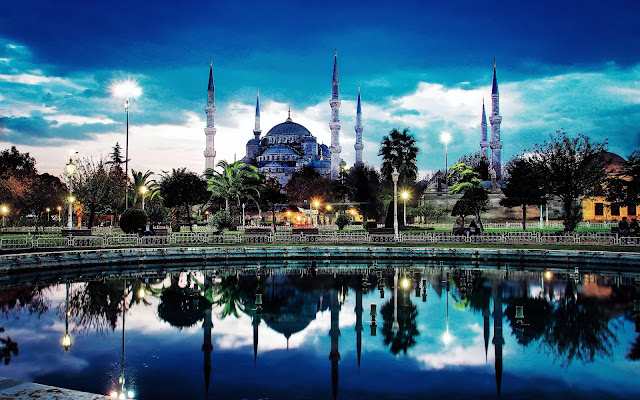Extending to the south from central Europe into the Mediterranean Sea,
the Balkan Peninsula includes the countries of
Albania, Bosnia & Herzegovina, Bulgaria, Croatia, Greece, Macedonia,
Montenegro, Romania, Serbia, Slovenia, and the geographical/political
region of European Turkey.
Turkey
is a nation straddling eastern Europe and western Asia with cultural
connections to ancient Greek, Persian, Roman, Byzantine and Ottoman
empires. Cosmopolitan Istanbul, on the Bosphorus Strait, is home to the
iconic Hagia Sophia, with its soaring dome and Christian mosaics, the
massive 17th-century Blue Mosque and the circa-1460 Topkapı Palace,
former home of sultans.
Albania
Albania,
on Southeastern Europe’s Balkan Peninsula, is a small country with
coastlines on the Adriatic and Ionian seas and an interior crossed by
the Albanian Alps. Along its southern coast, the Albanian Riviera is
known for its traditional Mediterranean villages, beach resorts and
vibrant nightlife. With history stretching back to antiquity, Albania is
also rich in castles and archaeological sites.
Albania Capital: Tirana
Bosnia and Herzegovina
Bosnia
and Herzegovina, a country on the Balkan Peninsula in southeastern
Europe, encompasses mountainous terrain, medieval villages and Muslim
and Christian landmarks. Its countryside is marked by deep gorges,
turquoise rivers and lakes, and the Dinaric Alps’ forests and crags.
It's a popular destination for outdoor sports such as hiking, mountain
biking, white-water rafting and skiing.
Bosnia and Herzegovina Capital: Sarajevo
Bulgaria
Bulgaria
is a Balkan nation with diverse terrain encompassing Black Sea
coastline, rivers, including the Danube, and a mountainous interior. A
cultural melting pot with Greek, Slavic, Ottoman and Persian influences,
it has a rich heritage of traditional dance, music, costumes and
crafts.
Bulgaria Capital: Sofia
Croatia
Croatia
is an Eastern European country with long coastlines on the Adriatic
Sea, encompassing more than a thousand islands, crossed by the Dinaric
Alps and dotted with castles. The major coastal city Dubrovnik has massive 16th-century walls
encircling an Old Town with Gothic and Renaissance buildings.
Croatia Capital: Zagreb
Greece
Greece
is a country in southeastern Europe consisting of 2 mainland peninsulas
and thousands of islands throughout the Aegean and Ionian seas. It's
often called the birthplace of Western civilization, and Athens, its
capital, retains ancient landmarks including the 5th-century-B.C.E.
Acropolis citadel and Parthenon temple. Greece is also known for its
beaches, from the black sands of Santorini to the party resorts of
Mykonos.
Greece Capital: Athens
Macedonia (FYROM)
Macedonia
is a landlocked Balkan nation of mountains, lakes and ancient towns
with Ottoman and European architecture. The capital, Skopje, is known
for its sprawling Old Bazaar quarter and historic buildings turned
museums, including the National Gallery of Macedonia, housed in a
15th-century Turkish bath complex. The southern city Ohrid, on a lake of
the same name, has a medieval townscape and hilltop castle.
Macedonia Capital: Skopje
Montenegro
Montenegro
is a small Balkan country with rugged mountains, medieval villages and a
narrow strip of beaches along its Adriatic coastline. The Bay of Kotor,
resembling a fjord, is dotted with coastal churches and fortified towns
such as Kotor and Herceg Novi. Durmitor National Park encompasses
limestone peaks, glacial lakes, wildlife such as bears and wolves, and
1,300m-deep Tara River Canyon.
Montenegro Capital: Podgorica
Romania
Romania
is a central European country known for the forested region of
Transylvania, preserved medieval towns such as Sighişoara and many
fortified churches and castles, notably clifftop Bran Castle, long
associated with the Dracula legend. The area is ringed by the Carpathian
Mountains, which are popular for trekking, climbing, skiing and bathing
in natural thermal spas.
Romani Capital: Bucharest
Serbia
Serbia
is a country on southeast Europe's Balkan peninsula with vast northern
plateaus and mountains with ski resorts to the south. Capital city
Belgrade is home to Communist-era architecture and Kalemegdan Park, site
of an ancient fortress held successively by the Roman, Byzantine and
Ottoman empires. Floating nightclubs on the Danube and Sava rivers are a
distinctive part of the city’s nightlife.
Serbia Capital: Belgrade
Slovenia
Slovenia,
a country in Central Europe, is known for its mountains, outdoor
recreation and ski resorts. Set on a glacial lake fed by thermal
springs, the town of Bled contains a church-topped islet and a cliffside
medieval castle. Nearby Triglav National Park in the Julian Alps offers
skiing and hiking, plus rafting along the Soča River, renowned for
aquamarine water.
Slovenia Capital: Ljubljana
Turkey
Turkey Major City in Europe: Istanbul




















0 коментара:
Постави коментар